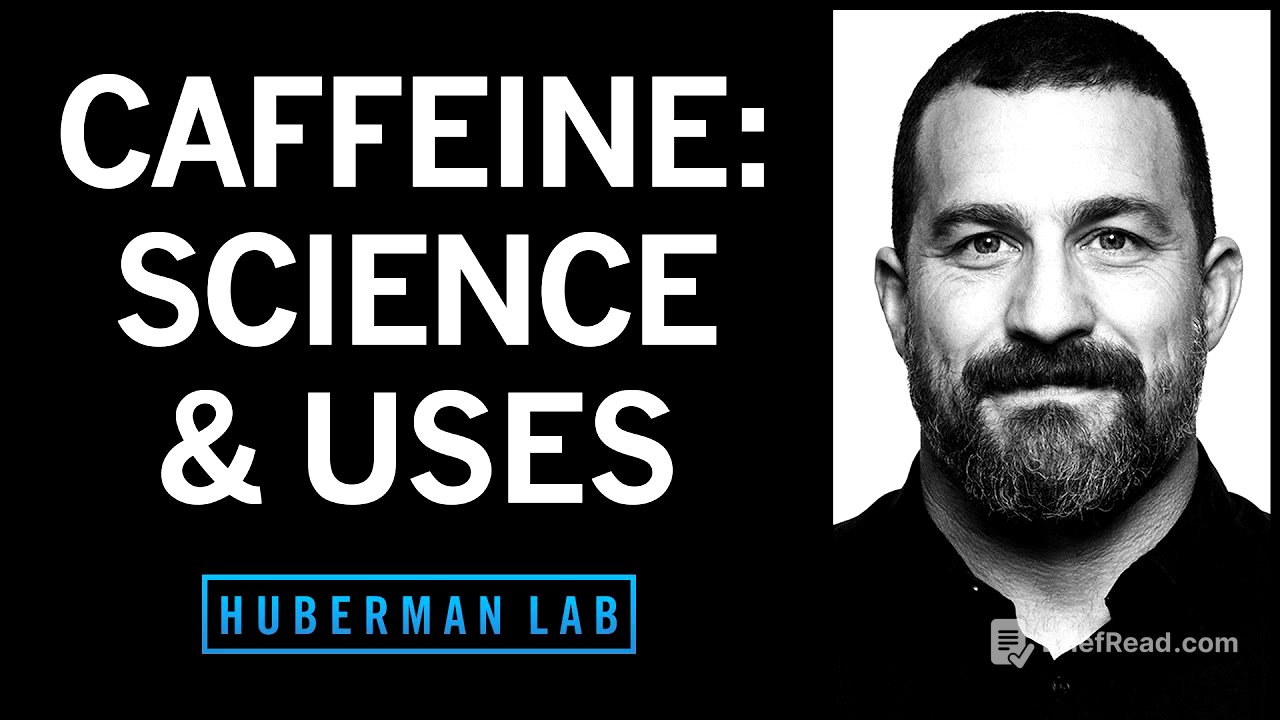TLDR;
This episode of the Huberman Lab podcast explores the science and practical applications of caffeine. It covers caffeine's effects on alertness, reinforcement, mental and physical performance, and overall health. It also provides tools for optimizing caffeine intake, including dosage guidelines, timing strategies, and ways to mitigate potential downsides like anxiety and sleep disruption.
- Caffeine is a widely used substance with both positive and negative effects.
- It acts as a strong reinforcer, influencing our preferences for certain foods, drinks, and experiences.
- Strategic caffeine use can improve mental and physical performance, mood, and overall health.
Caffeine [0:00]
Caffeine is a widely consumed substance, with over 90% of adults and 50% of adolescents using it daily. It increases alertness and reduces sleepiness, but also acts as a strong reinforcer, making us prefer the foods, drinks, and experiences associated with it. While caffeine has positive health benefits like neuroprotection, antidepressant effects, and performance enhancement, it's important to be aware of its reinforcing properties and potential downsides.
Tool: GLP-1, Yerba Mate, Satiety & Weight Loss [2:58]
GLP-1, or glucagon-like peptide 1, is a molecule found in the brain and body that reduces hunger by activating neurons in the hypothalamus and acting on receptors in the gut. Yerba maté tea stimulates GLP-1 release, aiding weight loss by blunting appetite. GLP-1 also stimulates thermogenesis by converting white fat cells into beige and brown fat cells, increasing basal metabolic rate. Fasted exercise can also stimulate GLP-1 release.
Levels, Eight Sleep, ROKA, Momentous Supplements [11:06]
Levels is a program that provides real-time feedback on how different foods affect your health using a continuous glucose monitor. Eight Sleep makes smart mattress covers with cooling, heating, and sleep-tracking capacity. ROKA makes eyeglasses and sunglasses designed for performance and visual clarity. Momentous Supplements offers supplements discussed on the Huberman Lab podcast.
Caffeine Benefits for Mental & Physical Performance [15:23]
Caffeine has neuroprotective and antidepressant effects due to its ability to increase neuromodulators like dopamine and norepinephrine. It improves mental and physical performance by reducing reaction time and enhancing memory recall. Caffeine increases alertness within five minutes of ingestion, peaking around 30 minutes and lasting up to 60 minutes.
Caffeine in Nature & Positive Reinforcement [20:23]
Caffeine exists in nature as a reinforcer, as demonstrated by a study on bees that prefer nectars containing small amounts of caffeine. This preference is not due to taste but to the way caffeine makes them feel, increasing alertness and work capacity. Caffeine's reinforcing effects are largely subconscious, influencing our preferences for caffeine-containing beverages and associated experiences.
Caffeine Effects on Brain; Reward Pathways [26:44]
Caffeine stimulates the release of dopamine and acetylcholine in the brain, increasing focus, alertness, and feelings of well-being. It also increases the number of dopamine receptors in the reward pathways of the brain, making positive experiences feel even better. Caffeine stimulates dopamine release in brain areas associated with alertness and cognition, rather than the classic reward pathways.
Caffeine as a Reinforcing Agent [29:55]
Caffeine acts as a reinforcing agent, making us feel slightly better in the minutes and hours after ingestion. This reinforces the behaviors and contexts associated with caffeine consumption, leading us to return to caffeine-containing beverages and foods. Unlike aversive agents that create a subconscious avoidance of certain experiences, caffeine creates a subconscious preference.
AG1 (Athletic Greens) [36:47]
AG1 (Athletic Greens) is a vitamin mineral probiotic drink that covers foundational nutritional needs, providing probiotics for gut health and adaptogens, vitamins, and minerals.
Caffeine, Adenosine & Reduced Sleepiness [38:01]
Caffeine, a methylxantine, binds to adenosine receptors, preventing adenosine from breaking down components of the energy production pathway and increasing cyclic AMP. While caffeine offsets fatigue and sleepiness, it doesn't create more energy but borrows it against the system, leading to a massive backlog of adenosine when the caffeine wears off. Caffeine allows us to divorce ourselves from the circadian cycle, but the healthiest schedule is still being alert during the day and asleep at night.
Tool: Caffeine Dosage, Caffeine Adapted [45:16]
A healthy caffeine dosage is 1 to 3 milligrams per kilogram of body weight. It's important to consider individual differences and start on the lower end of the range if not accustomed to caffeine. Caffeine-adapted individuals feel alert and relaxed after caffeine consumption, while non-adapted individuals experience increased heart rate and anxiety.
Tool: Delayed Caffeine Intake, Afternoon Crash & Sleep [53:44]
Delaying caffeine intake to 90 to 120 minutes after waking can offset the afternoon crash by allowing cortisol levels to peak and clear out residual adenosine. Getting bright light in the eyes and engaging in physical activity upon waking can further enhance this effect. If unable to delay caffeine intake, consuming half upon waking and the other half an hour later can help.
Morning Exercise & Residual Caffeine Effects [1:04:46]
Ingesting caffeine just prior to intense morning exercise is appropriate, but it may increase afternoon fatigue. Regular caffeine users can maximize performance-enhancing effects by abstaining from caffeine for a few days prior to ingestion. Consuming caffeine on an empty stomach enhances its mental and physical effects. Hydrating with water and electrolytes can offset jitteriness and maintain alertness.
Tool: Theanine & Jitteriness; Fasting, Intermittent Caffeine Use [1:07:56]
Theanine, present in green tea and available as a supplement, can offset the jitteriness of caffeine by competing for glutamate receptors. Dosages of 200 to 400 milligrams of theanine are effective, with up to 900 milligrams per day considered safe. Theanine has pro-sleep, antidepressant, and pro-endothelial effects.
Theanine: Effects & Dosage [1:13:00]
Theanine stimulates the glutamate and glutamine pathway, competing for excitatory neurotransmitter receptors and reducing overall alertness. Effective dosages for offsetting caffeine jitteriness are 200 to 400 milligrams, with up to 900 milligrams per day considered safe. Theanine has pro-sleep effects, enhancing the quality, depth, and duration of sleep.
InsideTracker [1:18:41]
InsideTracker is a personalized nutrition platform that analyzes data from blood and DNA to provide insights and recommendations for improving health and reaching goals.
Other Effects: Osteoporosis, Hormone Levels, Depression [1:19:45]
Caffeine does not directly cause or exacerbate osteoporosis, provided adequate calcium intake. It does not consistently increase or reduce testosterone or estrogen levels, but it can increase sex hormone binding globulin, slightly reducing free testosterone and estradiol. Regular caffeine intake in appropriate dosages seems to have an antidepressive effect.
Afternoon Caffeine & Sleep [1:27:41]
Quality sleep is the foundation of mental and physical health. Avoid caffeine intake in the 12 hours prior to sleep to prevent disruption of sleep architecture and quality. The quarter life of caffeine is 12 hours, meaning that 25% of its effects are still bioactive at that time, disrupting slow-wave sleep and rapid eye movement sleep.
Tool: Caffeine & Mental/Physical Performance; Cortisol & Caffeine Abstinence [1:31:45]
Caffeine improves reaction time, coordination, memory, physical dexterity, power output, endurance, and overall feelings of well-being. To maximize alertness-promoting effects, abstain from caffeine for five days and then ingest it 90 to 120 minutes after waking. A five-day abstinence from caffeine will increase the performance-enhancing effects of caffeine when taken on the sixth day.
Caffeine, Performance & Menstrual Cycle [1:46:04]
Caffeine increases peak aerobic cycling power in all phases of the menstrual cycle, making it an ergogenic aid for women regardless of their cycle phase.
Tool: Memory & Caffeine Timing; Adrenaline & Cold Exposure [1:47:27]
Spiking adrenaline after learning can greatly enhance memory for the information. This can be achieved through deliberate cold exposure or ingesting caffeine after a learning bout. Abstaining from caffeine while learning and then ingesting it afterward can enhance memory.
Caffeine & Naps [1:54:08]
The practice of the "nappuccino," drinking coffee before a nap, is not recommended due to the sleep-diminishing effects of caffeine and the potential for disrupting sleep. Naps of 90 minutes or less or non-sleep deep rest (NSDR) can improve mood, focus, and alertness without the need for caffeine.
Tool: Exercise, Caffeine, Dopamine & Positive Reinforcement [1:56:34]
Ingesting caffeine prior to exercise further increases dopamine release, providing a long-lasting increase in focus, alertness, and motivation. This combination acts as a reinforcer, making the experience of exercise and the period after exercise more pleasant and reinforcing.
Dopamine Stacking [2:01:55]
Combining caffeine and exercise to increase dopamine can be beneficial, but avoid stacking too many stimuli too often to protect baseline and peak dopamine levels. Pay attention to how you feel in the hours and days after the dopamine increase wears off and allow your baseline to return to normal.
Scheduling Caffeine to Maximize Its Effects [2:06:04]
An every-other-day schedule of caffeine intake can maximize positive effects without withdrawal symptoms. Consider consuming caffeine only on days of resistance training.
Pro-Health Effects of Caffeine [2:08:33]
Regular caffeine consumption can help offset the probability of developing Parkinson's and Alzheimer's-related dementia. Caffeine increases dopamine and acetylcholine release, which are defective in these diseases. It can also diminish headache and provide brief relief from asthma.
Tool: Sugar Cravings & Reinforcing Effects of Caffeine [2:13:38]
Caffeine is a potent reinforcer of foods, people, and experiences. Avoid co-ingesting caffeine with sugar to reduce sugar cravings. Use caffeine to increase appetite for certain things, such as herbal tea.
Zero-Cost Support, YouTube Feedback, Spotify & Apple Reviews, Sponsors, Social Media, Momentous Supplements, Neural Network Newsletter [2:20:17]
Support the podcast by subscribing to the YouTube channel and leaving reviews on Spotify and Apple. Check out the sponsors and follow Huberman Lab on social media. Visit livemomentous.com/huberman for supplements and sign up for the newsletter at hubermanlab.com.









